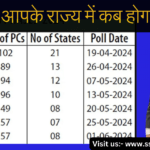The UPSC Civil Services Exam Important Topic Of Polity M. Laxmi Kant and NCERT | LAXMI Kant Polity Book is undoubtedly one of the most challenging examinations in India. For aspirants aiming to crack this prestigious exam, mastering the subject of Polity is crucial. This is where M. Laxmikant’s book, “Indian Polity,” steps in as an invaluable resource.
Why is M. Laxmikant Important?
Comprehensive Coverage: Laxmikant’s book provides a thorough understanding of the Indian Constitution, its framework, and its various articles. It delves into critical aspects like Fundamental Rights, Directive Principles, the Union and its Territories, and the Panchayati Raj system.
Clear and Concise Language: The book is known for its lucid and easy-to-understand language. Complex constitutional concepts are explained in a simplified manner, making them accessible even for beginners.
Focus on Factual Accuracy: The book is meticulously researched and updated regularly, ensuring aspirants have access to the most accurate and current information. This is vital for scoring well in the objective nature of the Prelims exam.
Strong Foundation for Mains: While primarily catering to the factual nature of the Prelims, Laxmikant’s book also provides a strong foundation for the Mains exam. Understanding the core concepts allows aspirants to analyze and interpret political issues critically in their essays and answer writing.
Not a Standard Resource:
It’s important to understand that M. Laxmikant, though immensely valuable, is not a standalone resource for UPSC Polity preparation. Here’s what to consider for a well-rounded approach:
Supplement with Current Affairs: The UPSC CSE demands an understanding of how the Constitution applies to contemporary issues. Reading newspapers and analytical articles alongside Laxmikant helps bridge the gap between theory and practice.
Incorporate Additional Sources: For a deeper understanding of specific topics or critical analysis, aspirants can refer to reference books by reputed authors or online resources recommended by coaching institutes.
Practice Makes Perfect: Regularly solving previous years’ UPSC question papers and mock tests helps aspirants gauge their understanding of the subject and identify areas for improvement.
Important Topic Of Laxmikant & NCERT
1.Constitutional Framework
2.Salient Features of the Constitution
3.Union and Its Territory
4.System of Government
5.Inter-State Relations
6.Central Government
7.Central Council of Ministers
8.Cabinet Committees
9.Indian Parliamentary Group
10.Judicial Review
- Judicial Activism
- Public Interest Litigation
- State Government
- State Council of Ministers
- Consumer Commissions
- Local Government
- Union Territories and Special Areas
- Constitutional Bodies
- State Public Service Commission
- Special Officer for Linguistic Minorities
- Advocate General of the State
- Non-Constitutional Bodies
- National Human Rights Commission
- Central Information Commission
- Central Bureau of Investigation {C.B.I}
- Lokpal and Lokayuktas
- National Investigation Agency {N.I.A}
- Delimitation Commission of India
- Other Constitutional Dimensions
- Official Language
- Public Services
- .Political Dynamics
31.Election Laws
32.Electoral Reforms
33.Anti-Defection Law
34.Working of the Constitution
35.Judgements & Doctrines {FOR MAINS }
36.Comparison of the Constitutions
37.Articles of the Constitution (1-395)
38.Subjects of Union, State and Concurrent Lists
Class 11th NCERT IMPORTANT CHAPTERS ARE CONSTITUTION: WHY AND HOW? RIGHTS IN THE INDIAN CONSTITUTIONELECTION AND REPRESENTATIONEXECUTIVELEGISLATUREJUDICIARYFEDERALISMLOCAL GOVERNMENTSCONSTITUTION AS A LIVING DOCUMENT THE PHILOSOPHY OF THE CONSTITUTION.1.Political Theory: An Introduction
2.Freedom
3.Equality
4.Social Justice
5.Rights
6.Citizenship
7.Nationalism
8.Secularism
The NCERT textbook for Class 11th, “Indian Constitution at Work,” provides a comprehensive introduction to the Indian Constitution, its core principles, and the framework of governance. This initial exposure equips students with a fundamental understanding of the system they aspire to be a part of.
Building a Strong Foundation:
Class 11th Polity delves into crucial aspects like the structure of government – Legislature, Executive, and Judiciary. It sheds light on fundamental rights and duties, directive principles of state policy, and the federal system. Grasping these concepts early allows for a deeper understanding as students progress through their preparation.
Developing Analytical Skills:
The subject encourages critical thinking and analysis. Students learn to dissect complex issues, identify causes and consequences, and evaluate various perspectives on governance. These analytical skills are refined through essay writing and discussions, forming the bedrock for effective problem-solving in the future.
Nurturing an Informed Citizenry:
Civil servants play a vital role in shaping the nation’s destiny. A thorough understanding of Class 11th Polity fosters an informed citizenry. Students gain insights into contemporary issues like center-state relations, local governance, social justice, and electoral processes. This knowledge empowers them to contribute meaningfully to public discourse and policymaking.
Head Start for UPSC Preparation:
The topics covered in Class 11th Polity form a significant portion of the UPSC syllabus, particularly the General Studies Paper II on Governance, Constitution, and Social Justice. Starting early allows for a gradual and deeper understanding, preventing last-minute cramming and promoting long-term knowledge retention.
Building Confidence:
Acing Class 11th Polity can be a confidence booster for aspiring civil servants. It demonstrates a commitment to understanding the system and a passion for public service. This early academic success can motivate students to persevere through the rigors of UPSC preparation.
In conclusion, Class 11th Polity is not merely a subject, but a stepping stone for aspiring civil servants. It lays the foundation for a strong understanding of governance, hones critical thinking skills, and fosters a sense of civic responsibility. By prioritizing Class 11th Polity, students embark on their UPSC journey with a solid base and a clear vision for their future in service to the nation.










